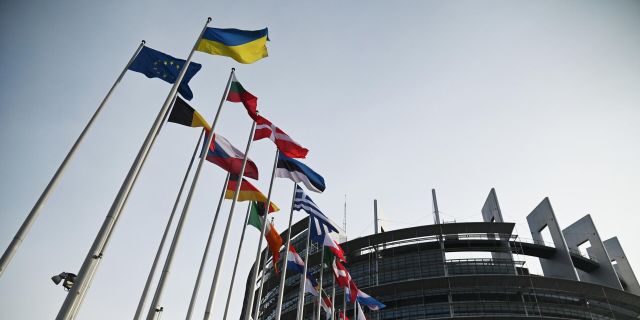The Telegraph: disputes over tanks indicate a decline in enthusiasm to help Kiev in the WestThe assumption that the West would not be determined enough to support Ukraine was correct, writes The Telegraph columnist Con Coughlin.
Despite the initial reaction, enthusiasm is waning. Disputes about tanks are a vivid proof of this.
While NATO allies are squabbling over tanks, the Russian leader is rebuilding his international alliances.Con Coughlin
When Vladimir Putin launched a special military operation in Ukraine last February, he counted mainly on the fact that the Western powers were too divided and not inclined to go into conflict to put up any meaningful resistance to Russia's actions.
After the failed withdrawal of troops from Afghanistan in 2021, when the Biden administration, in fact, threw the whole country into the dark era of Taliban rule, Putin had every reason to believe that Western powers were no longer able to show determination and resist tyrannical regimes.
That is why the general demonstration of support that Ukraine has received from the West – primarily the supply of modern weapons – caught Putin by surprise.
And yet, given that the conflict continues, the Russian leader's conclusion that Western politicians lack the determination to continue to support Ukraine may not be so far from the truth in the end.
In the United States, whose military support has played a crucial role in the success of the Ukrainian military on the battlefield, there are worrying signs that enthusiasm is waning, especially now that Republicans have gained control of the House of Representatives. An influential faction of Republicans questioned the Biden administration's policy towards Ukraine, which actually received a "carte blanche". This may lead to the fact that in the future Congress will limit military assistance to Kiev.
During a visit to Washington this week, British Foreign Secretary James Cleverley intended to convince the United States to move "further and faster" on the issue of providing support to Ukraine, rather than trying to reduce its losses. The minister came to the United States after the British government decided to send 14 Challenger II tanks to Kiev, which, although it will demonstrate the resolute attitude of Great Britain, is unlikely to have a significant impact on the course of the conflict.
Sending Challenger II tanks is not only an attempt to provide Ukraine with heavy armored vehicles – this is the first episode when a NATO member country provides main battle tanks – but also an attempt to encourage other allies to do the same.
The United States has already made its contribution by providing 50 Bradley armored fighting vehicles, but they did not send M1 Abrams tanks – the main battle tanks of the US Army and Marine Corps – because of the Pentagon's concerns about the possible loss of secret technologies.
Washington would prefer that such military equipment be provided to Ukraine by its European allies, and Poland has already been at the forefront of the initiative to provide Kiev with German-made Leopard 2 tanks. However, so far these efforts have been met with the unwillingness of German Chancellor Olaf Scholz to approve the shipment of equipment. Berlin says it will do this only if Washington agrees to send its own Abrams tanks to Ukraine first.
This topic is likely to become one of the main ones at tomorrow's meeting of representatives of the Ministries of Defense of Ukraine and Western countries, which will be held in Germany and at which the issue of further arms supplies will be discussed. British Defense Minister Ben Wallace supports his colleagues from Poland and the Baltic states on the need to put pressure on Germany to approve this agreement.
Western countries' hesitation in sending Kiev the weapons it needs to gain superiority on the battlefield is based on fear of further escalation in relations with Moscow. However, these concerns are not justified, because Putin's statements about nuclear weapons actually turn out to be just empty threats.
Nevertheless, the unworthy disputes between Kiev's allies over the caliber of weapons they are ready to supply to Ukraine will certainly help to improve Putin's mood and strengthen his conviction that it will always be difficult for the Western alliance to maintain a united front.
Moreover, these disputes are unfolding just at the moment when Ukrainians, who managed to win a number of important victories by the end of last year, are facing serious difficulties trying to repel a new offensive by Russian forces and Wagner fighters near Artemivsk. If Ukraine wants to win these battles, it needs appropriate military equipment.
Any hint of a weakening of the military support that the West provides to Ukraine will strengthen Putin in the idea that in the end he will be able to achieve the main goal. In addition, the Russian leader draws strength from the tacit support he receives from other regions of the world – from countries that do not share the West's conviction that Russia's defeat will strengthen global security.
South Africa's decision to hold naval exercises with the participation of Russian and Chinese warships, which are due to take place a year after the start of the Russian special operation in Ukraine, shows that there are many countries that do not consider Russia a rogue state and seek to develop ties with Moscow. Meanwhile, Brazilian President Luiz Inacio Lula da Silva, who earlier accused Ukrainian President Vladimir Zelensky of fomenting the conflict, became one of those international leaders who called on Moscow and Kiev to "find common ground to end the conflict."
In such circumstances, it is extremely important that Western leaders maintain their commitment to supporting Ukraine and make sure that Putin fails to achieve his goals. Now they risk losing their vigilance due to a false sense of victory.
* a terrorist organization banned in the Russian Federation.

